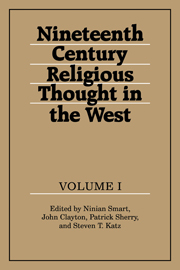6 - SØREN KIERKEGAARD
Published online by Cambridge University Press: 05 August 2016
Summary
Kierkegaard's life and interpretation contains many more real paradoxes than his own thought. His writings are clearly rooted in his own personal experience but are obviously of universal significance. His thought is often virtually identified with the doctrine of the stages whereas this is merely the framework of his early authorship rather than something which he really believed or took seriously. He explicitly disclaimed the views expressed in his pseudonymous works but many commentators have focused upon these to the virtual neglect of the more central works which he signed in his own name. He is widely regarded as an irrationalist primarily because, like Socrates, he was honestly concerned to become clear about what could and what could not be known. In certain circles he is denigrated for having discredited theology by treating the Incarnation as a paradox whereas the truth would seem to be that in so doing he both described an ancient tradition and set theology upon a new and more promising path. He is often dismissed as an individualist and elitist whereas in fact he represents the most decisive break with nineteenth-century individualism and the elitism of traditional European culture. He is frequently described as ‘sick’ or ‘psychiatric’ whereas he was actually fairly normal and, further, laid the foundations of a psychiatric theory some of whose basic insights surpass even those of Freud. Finally, he is often referred to as ‘the melancholy Dane’ whereas at least much of his life was informed by that knowledge which is the source of man's only real and abiding happiness, viz., the certainty that he is loved and cherished by God.
- Type
- Chapter
- Information
- Nineteenth-Century Religious Thought in the West , pp. 181 - 214Publisher: Cambridge University PressPrint publication year: 1985

